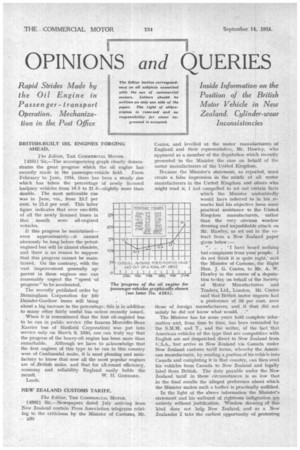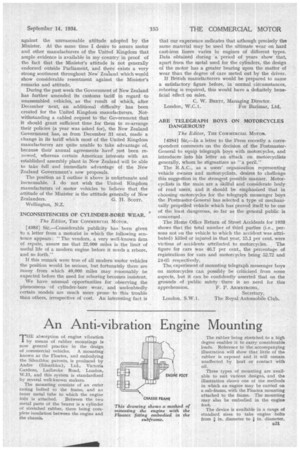OPINIONS and QUERIES
Page 40

Page 41

If you've noticed an error in this article please click here to report it so we can fix it.
I3RITISH-BUILT OIL ENGINES FORGING AHEAD.
The Editor, THE COMMERCIAL MOTOR.
143811 Sir,—The accompanying graph clearly demonstrates the great progress which the oil engine has recently made ill the passenger-vehicle field. From If this progress be maintained— even approximately—it cannot obviously be long before the petrolengined bus will be almost obsolete, and there is no reason to suppose that this progress cannot be maintained. On the contrary, with the vast improvement generally apparent in these engines one ran reasonably expect the " speed of progress " to be accelerated.
The recently published order by Birmingham. Corporation for 100 Daimler-Gardner buses will bring about a big increase in the percentage; this is in addition to many other fairly useful bus orders recently issued.
When it is remembered that the first oil-enginccl bus to be run in public service (the famous Mercedes-Benz Karrier bus of Sheffield Corporation) was put into service only on March 9, 1930, one cars truly say that the progress of the heavy-oil engine has been more than remarkable. Although we have to acknowledge that the first engines of this type to be ran in this country were of Continental make, it is most pleasing and satisfactory to know that now all the most popular engines are of tBritish make, and that for all-round efficiency, economy and reliability England easily bolds the record. W. H. GODDARD. Leeds.
Coates, and levelled at the motor manufacturers of Fngland aud their representative, Mr. Hawley, who :appe-ared as a member of the deputation which recently presented to the Minister the case on behalf of the motor manufacturers of the United Kingdom.
Because the Minister's statement, as reported., must create a false impression in the -minds of all motor manufacturers in the United Kingdom and others who feel compelled to set out certain facts might read it, I which the Minister undoubtedly would have referred to in his remarks had his objective been some practical assistance to the United Kingdom manufacturers, rather than the very obvious window dressing and unjustifiable attack on Mr. Hawley, as set out in the extract from a New Zealand paper given below :—
<6 I have heard nothing
but complaints from your people. I do not think it is quite right,' .said the Minister of Customs, the Right Hon. J. G. Coates, to Mr. A. W. Hawley in the course of a deputation to-day on behalf of the Society of Motor Manufacturers and Traders, Ltd., London. Mr, Coates said that British motor imports had
. a preference of 58 per cent. over thoseof foreign manufacturers, and if that, did not satisfy he did not know what would.
The Minister has for some years held complete information and, from time to time, has been reminded by the S.M.M. and T., and the writer, Of the fact that American vehicles of the type that are competitive with English are not despatched direct to New Zealand from U.S.A., 'but arrive in New Zealand via Canada under New Zealand customs tariff terms, whereby the American manufacturer, by sending a portion of his vehicle into Canada and completing it in that country, can then send his vehicles from Canada to New Zealand and legally label them British. The duty payable under the New Zealand tariff in these circumstances is so low that in the final results the alleged preference about which the Minister makes such a bother is practically nullified.
In the light of the above information the Minister's statement and his outburst of righteous indignation,are entirely without justification. 'Window dressing of this kind does not help New Zealand., and as a New Zealander I take the earliest opportunity :of protesting
against the unreasonable attitude adopted by the Minister. At the same time I desire to assure motor and other manufacturers of the United Kingdom that ample evidence is available in my country in proof of the fact that the Minister's attitude is not generally endorsed outside Parliament, and there exists a very strong sentiment throughout New Zealand which would show considerable resentment against the Minister's remarks and attitude.
During the past week the Government of New Zealand has further amended its customs tariff in regard to unassembled vehicles, as the result of which, after December next, an additional difficulty has been created for the United Kingdom manufacturers. Notwithstanding a cabled request to the Government that it should grant sufficient time for them to re-arrange their policies (a year was asked for), the New Zealand Government has, as from December 31 next, made a change in its tariff which most of the United, Kingdom manufacturers are quite unable to take advantage of, because their annual agreements have just been renewed, whereas certain American interests with an established assembly plant in New Zealand will be able to take full and immediate advantage of the New Zealand Government's new proposals.
The position as I outline it above is unfortunate and inexcusable. I do not wish the United Kingdom manufacturers of motor vehicles to believe that the attitude of the Minister is the attitude generally of New
Zealanders. G. H. SCOTT. Wellington, N.Z.
INCONSISTENCIES OF CYLINDER-BORE WEAR. The Editor, THE COMMERCIAI MOTOR.
[4383] Sir,—Considerable publicity has been given to a letter from a motorist in which the following sentence appears: "The vendors, a very well-known firm of repute, assure me that 22,000 miles is the limit of useful life of a modern engine before it needs a rebore, and so forth."
If this remark were true of all modern motor vehicles the position would be serious, but fortunately there are many from which 40,000 miles may reasonably be expected before the need for reboring becomes insistent.
We have unusual opportunities for observing the phenomena • of cylinder-bore wear, and undoubtedly certain, models are much more prone to this trouble than others, irrespective of cost. An interesting fact is that our experience indicates that although precisely the same material may be used the ultimate wear on hard cast-iron liners varies in engines of different types. Data obtained during a period of years show that, apart from the metal used for the cylinders, the design of the motor has a greater bearing upon the matter of wear than the degree of care meted out by the driver.
If British manufacturers would be prepared to name a satisfactory figure before, in normal circumstances, reboring is required, this would have a definitely beneficial effect on sales.
C. W. Bizarr, Managing Director.
London, W.C.1. For Bariraar, Ltd.
ARE TELEGRAPH BOYS ON MOTORCYCLES DANGEROUS?
The Editor, THE COMMERCIAL MOTOR.
[4384] Sir,—In a letter to the Press recently a correspondent comments on the decision of the PostmasterGeneral to equip telegraph boys with motorcycles, and introduces into his letter an attack on motorcyclists generally, whom he stigmatizes as "a peril."
The R.A.C., as a users' organization representing vehicle owners and motorcyclists, desires to challenge this suggestion in the strongest possible manner. Motorcyclists in the main are a. skilful and considerate body of road users, and it should be emphasized that in choosing motorcycles for the telegraph messenger boys the Postmaster-General has selected a type of mechanically propelled vehicle which has proved itself to be one of the least dangerous, so far as the general public is conceraed.
The Home Office Return of Street Accidents for 1933 shows that the total number of third parties (i.e., persons not on the vehicle to which the accident was attributed) killed or injured in that year, 15.1 per cent, were victims of accidents attributed to motorcycles. The figure for cars was 46.7 per cent., the percentage of registrations for cars and motorcycles being 52.72 and 24-65 respectively.
Thq experiment of mounting telegraph messenger boys on motorcycles can possibly be criticized from some aspects, but it can be confidently asserted that on the grounds of . public safety -there is no need for this
apprehension. F. P. ARMSTRONG, Secretary, London, S.W.1. The Royal Automobile Club.




















































































